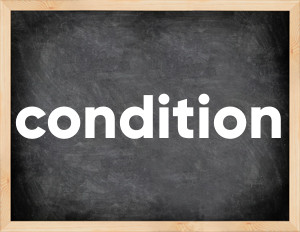 The English verb 'condition' is pronounced as [kənˈdɪʃn].
The English verb 'condition' is pronounced as [kənˈdɪʃn].
Related to:
regular verbs.
3 forms of verb condition: Infinitive (condition), Past Simple - (conditioned), Past Participle - (conditioned).
Here are the past tense forms of the verb condition
👉 Forms of verb condition in future and past simple and past participle.
❓ What is the past tense of condition.
Condition: Past, Present, and Participle Forms
| Base Form | Past Simple | Past Participle |
|---|---|---|
| condition [kənˈdɪʃn] |
conditioned [kənˈdɪʃənd] |
conditioned [kənˈdɪʃənd] |
What are the 2nd and 3rd forms of the verb condition?
🎓 What are the past simple, future simple, present perfect, past perfect, and future perfect forms of the base form (infinitive) 'condition'?
Learn the three forms of the English verb 'condition'
- the first form (V1) is 'condition' used in present simple and future simple tenses.
- the second form (V2) is 'conditioned' used in past simple tense.
- the third form (V3) is 'conditioned' used in present perfect and past perfect tenses.
What are the past tense and past participle of condition?
The past tense and past participle of condition are: condition in past simple is conditioned, and past participle is conditioned.
What is the past tense of condition?
The past tense of the verb "condition" is "conditioned", and the past participle is "conditioned".
Verb Tenses
Past simple — condition in past simple conditioned
(V2).
Future simple — condition in future simple is condition (will + V1).
Present Perfect — condition in present perfect tense is
conditioned
(have/has + V3).
Past Perfect — condition in past perfect tense is
conditioned
(had + V3).
condition regular or irregular verb?
👉 Is 'condition' a regular or irregular verb? The verb 'condition' is regular verb.
Examples of Verb condition in Sentences
- The authorities conditioned its ratification upon the following meetings (Past Simple)
- My purchases are conditioned by the amount I earn. (Present Simple)
- The behavior of people is conditioned by society. (Present Simple)
- All our subjects are conditioned for combat. (Present Simple)
- The measures have conditioned to a decrease in the gender imbalance in the election results. (Present Perfect)
- They are simply conditioned to survive. (Present Simple)
- The peculiarities of the geographic location of Russia, the specificity of the historical processes of the formation of the Russian state conditioned the ethnic and cultural diversity of its population. (Past Simple)
- A special public health problem, affecting women and, especially, men are socially conditioned diseases. (Present Simple)
- Many women are conditioned from birth to take what they are told on faith rather than asking questions. (Present Simple)
- A child born far in the North quickly becomes conditioned to the long, dark polar winters. (Past Simple)